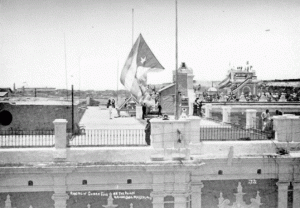
For Sandra, a teenager who is currently in the 8th grade, January 1st of 1959 is the independence and birth date of Cuba as a republic. And believe me, the girl is not ignorant. She has excellent grades and enjoys good literature and cinema.
But no history professor mentioned to her that it was actually on May 20th 1902 that the Republic of Cuba was born. The official version of history tries to avoid the date.
When the professors speak about the first years of republican life, they always add the phrase “a mediated republic”. The history of Cuba which is taught today in the classrooms lacks any sense. It’s black and white.
Only what the government is interested in is mentioned: The 10 years war, Carlos Manuel de Cespedes, Perucho Figueredo, and Ignacio Agramonte, among others, and they leave out the profound existing contradictions between the independence fighters of the time. They obliquely mention the life of Jose Marti, Antonio Maceo, and the Dominican Maximo Gomez.
That 20th of May in 1902 is barely mentioned at all in the Cuban classrooms. The new generations do not know that Tomas Estrada Palma was the first Cuban president. On that day, Havana locals witnessed how the American flag was lowered (interventionist country in 1898 and 1902) and how the flag of the solitary star was raised.
Youths and adolescents are stuffed with dates and facts about the assault on the Moncada barracks in 1953 by Fidel Castro. Also, from the moment one enters first grade they talk a lot about the guerrilla war in the massive mountainous area of the Sierra Maestra. And it’s not a bad thing that the victors are the one who tell their story. But a capital sin of the regime’s historiography has been to avoid mentioning all the events which occurred during the 57 years before the triumph of the olive green revolution.
That historical amnesia can be seen whenever we look at any aspect of Cuban life. It seems as if all that is good or grandiose came from the hand of Fidel Castro. A country which forgets its past will have an uncertain future.
One must turn the page on the way the official media tells history. That republic was not perfect. Many elections were fraudulent. During a specific period, the communist party was illegal. There were dictators, Machado and Batista. Many corrupt politicians. And we depended economically on the United States.
It’s true. But during 5 decades of a republic they introduced a Constitution — the one from 1940 — which was advanced for its time. There was freedom of the press; laws which benefited the workers; independence from tribunals and the existence of Habeas Corpus.
Also due to its close proximity to the United States, public phones, radio, and television were introduced in Cuba before any other European nations. Havana was more of an important city than Zurich or Brussels.
One does not have to be a supporter or an adversary of the Castro brothers in order to realize the twisted turn given to our republican history. If you carry out a poll of secondary school students, very few will know the day which the republic was born.
It’s unfortunate. Just like the United States has its 4th of July and Mexico has its 16th of September, the Day of the Nation in Cuba is May 20th. Even if the regime would rather ignore it.
Translated by Raul G.
May 22 2011
